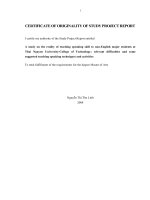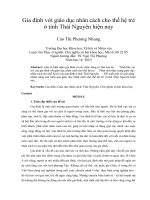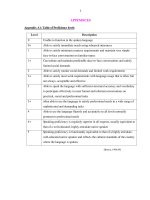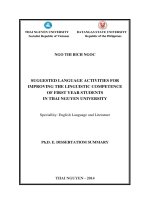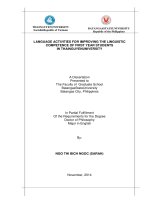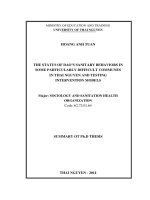Enhancing the mechanical engineering program of Thai Nguyen University through redesigned learning outcomes
Bạn đang xem bản rút gọn của tài liệu. Xem và tải ngay bản đầy đủ của tài liệu tại đây (5.41 MB, 199 trang )
ENHANCING THE MECHANICAL ENGINEERING PROGRAM
OF THAI NGUYEN UNIVERSITY THROUGH
REDESIGNED LEARNING OUTCOMES
___________________________
A DISSERTATION
Presented to the Faculty of the Graduate School
Southern Luzon State University, Lucban, Quezon, Philippines
in Collaboration with
Thai Nguyen University, Socialist Republic of Vietnam
___________________________
In Partial Fulfillment
of the Requirements for the Degree
Doctor of Philosophy in Educational Management
___________________________
By
PHAM VAN HUNG (HERO)
Số hóa bởi Trung tâm Học liệu – ĐHTN
2
October 2014
Số hóa bởi Trung tâm Học liệu – ĐHTN
3
Số hóa bởi Trung tâm Học liệu – ĐHTN
4
Số hóa bởi Trung tâm Học liệu – ĐHTN
5
ACKNOWLEDGMENT
The author would like to express her gratitude to the following persons
who had great contribution to the preparation and accomplishment of this
research.
Sincerest and profound gratitude and appreciation are extended to all
the persons who in their own special ways have made this thesis a reality. The
author is most grateful to:
Dr. Cecilia N. Gascon, President of Southern Luzon State University,
Republic of the Philippines, for her invaluable contribution in the establishment
of the Master of Arts in Educational Management program in Thai Nguyen
University;
Prof. Dr. Dang Kim Vui, President of Thai Nguyen University, the
Socialist Republic of Vietnam for his incomparable contribution and support to
the Doctor of Philosophy in Educational Management program under the
auspices of the Southern Luzon State University, Republic of the Philippines;
Dr. Walberto A. Macaraan, Vice-President for Academic Affairs, for his
support to the tie-up program between SLSU and TNU;
The Panel of Examiners, for their invaluable comments, suggestions and
recommendations to enhance the thesis manuscript of the author of this study;
Dr. Melchor Milo O. Placino, his adviser, for his dedication, enduring
patience and concern, guidance, sincere hopes and encouragement for the
researcher to finish the manuscript;
Dr. Apolonia Espinosa, professor of advanced statistics for her
patience and support;
Số hóa bởi Trung tâm Học liệu – ĐHTN
6
To the Staff of the Learning Resource Center of Thai Nguyen
University, for allowing the researcher to utilize valuable sources of books and
references;
To the authors and researchers of books and unpublished graduate
theses that served as reliable source of data and information presented in the
study;
Prof. Phan Quang, the Rector of Thai Nguyen University of
Technology, for the approval of the researcher’s request to conduct the study;
The respondents of the study, for their active involvement, without
their cooperation the result of this dissertation may not be possible;
His loving classmates and colleagues, for endless support and
friendship which inspires the researcher to do his best in finishing the study;
His wife – Dinh Thi Kim Phuong, the only person with a special space
in his heart, for being his inspiration;
His parents and siblings, for their encouragement, financial, moral and
spiritual supports and for continuously believing that he can finish the task to
the best of his abilities
PVH
DEDICATION
Số hóa bởi Trung tâm Học liệu – ĐHTN
7
With pride and honor,
this piece of work is lovingly dedicated
to my beloved parents, wife and children.
PVH
TABLE OF CONTENTS
Số hóa bởi Trung tâm Học liệu – ĐHTN
8
PAGE
TITLE PAGE ………………………………………………………………..
i
APPROVAL SHEET ……………………………………………………….
ii
CERTIFICATE OF ORIGINALITY ………………………………………..
iii
ACKNOWLEDGMENT …………………………………………………..
iv
DEDICATION ………………………………………………………………
vi
TABLE OF CONTENTS …………………………………………………..
vii
LIST OF TABLES ………………………………………………………….
ix
LIST OF FIGURES…………………………………………………………
xii
LIST OF APPENDICES …………………………………………………...
xiii
ABSTRACT …………………………………………………………………
xiv
CHAPTER
I
II
INTRODUCTION ……………………………………………
1
Background of the Study …………………………………..
4
Objectives of the Study …………………………………….
8
Significance of the Study …………………………………..
9
Scope and Limitation of the Study ………………………..
10
Definition of Terms ………………………………………….
11
REVIEW OF LITERATURE ……………………….……….
15
Learning Outcomes ………………………………………….
15
Types of Learning Outcomes ………………………………
18
Learning Outcomes and Outcomes-Based Approaches ..
23
The Role of Learning Outcomes in Program Design and
III
Improvement …………………………………………………
25
Learning Outcomes and Learning Objectives ……………
29
Formulation of Learning Outcomes ………………………..
30
Conceptual Framework …………………...….………..……
33
Research Paradigm ……………………………...….………
42
METHODOLOGY …………………………………………… 45
Locale of the Study ………………………….………………
Số hóa bởi Trung tâm Học liệu – ĐHTN
45
9
IV
Research Design …………………………….………………
45
Population and Sampling ………………….…...…………..
45
Instrumentation ………………………...…………..…….….
46
Data Gathering Procedure ………………………………….
48
Statistical Treatment …….…………………………………..
48
RESULTS AND DISCUSSIONS ……………………….….
51
The importance of each learning outcome topic under
the view of the four main stakeholders of the MEP ……...
51
Evaluation of the current status of learning outcomes and
the expected LOs of MEP …………………………………..
66
The correlation among the important level of learning
outcomes, current proficiency level of the students, the
expected proficiency level that the students should
achieve ……………………………………………………….. 103
The Process for formulating the redesigned learning
outcomes for the MEP …………………………………………….
V
104
SUMMARY OF FINDINGS, CONCLUSIONS AND
RECOMMENDATIONS
Summary …………………….…………………………….…
122
Conclusions ……………………………………………….…
125
Recommendations ……………………………………..……
127
REFERENCES
129
……………………………………………………………..
APPENDICES
132
……………………………………………………………...
CURRICULUM VITAE
160
…………………………………………………….
Số hóa bởi Trung tâm Học liệu – ĐHTN
10
LIST OF TABLES
TABLE
1
2
3
4
5
6
7
8
9
10
PAGE
Weighted Mean Distribution of the LO Topics in Terms of the
Importance of the Disciplinary Knowledge and Reasoning as
viewed by the Students …………………………………………
52
Weighted Mean Distribution of the LO Topics in Terms of the
Importance of Personal and Professional Skills and
Attributes and the Interpersonal skills Topics as viewed by
the Students ………………………………………………………
53
Weighted Mean Distribution of the LO Topics in Terms of the
Importance of Skills in Applying Knowledge to Benefit
Society as viewed by the Students …………………………….
54
Weighted Mean Distribution of the LO Topics in Terms of the
Importance of the Disciplinary Knowledge and Reasoning
Under the View of the Alumni …………………………………..
55
Weighted Mean Distribution of the LO Topics in Terms of the
Importance of Personal and Professional Skills and
Attributes Topics as viewed by the Alumni …………………..
56
Weighted Mean Distribution of the LO Topics in Terms of the
Importance of Skills in Applying Knowledge to Benefit
Society …………………………………………………………….
58
Weighted Mean Distribution of the LO Topics in Terms of the
Importance of the Disciplinary Knowledge and Reasoning as
viewed by the Teachers …………………………………………
59
Weighted Mean Distribution of the LO Topics in Terms of the
Importance of Personal and Professional Skills and
Attributes and Interpersonal Skills Topics as viewed by
Teachers ………………………………………………………….
60
Weighted Mean Distribution of the LO Topics in Terms of the
Importance of Skills in Applying Knowledge to Benefit
Society …………………………………………………………….
61
Weighted Mean Distribution of the LO Topics in Terms of the
Importance of the Disciplinary Knowledge and Reasoning as
viewed by the Employers ……………………………………….
63
Số hóa bởi Trung tâm Học liệu – ĐHTN
11
TABLE
11
PAGE
Weighted Mean Distribution of the LO Topics in Terms of the
Importance of Personal and Professional Skills and
Attributes Topics as viewed by Employers ……………………
64
Weighted Mean Distribution of the LO Topics in Terms of the
Importance of the Interpersonal Skills: Teamwork and
Communication - Applying Knowledge to Benefit Society
Topics Under the View of the Employers ……………………..
65
The Current and Expected Proficiency Level of Designing as
viewed by Students ………………………..…………………….
68
The Current and Expected Proficiency Level of Operation as
viewed by Students ……………………………………………...
70
Results of Survey on Knowledge of Underlying Mathematics
and Sciences ……………………………………………………..
72
16
Results on Analytical Reasoning and Problem Solving ……..
74
17
Results on System Thinking and Attitudes, Thoughts and
Learning …………………………………………………………..
76
18
Results on Ethics, Equity and Other Responsibilities ………..
77
19
Results on External, Societal and Environmental Context ….
79
20
Results on Conceiving, Systems Engineering and
Management ……………………………………………………..
80
21
Results on Operations …………………………………………..
81
22
Results of Survey on Knowledge of Underlying Mathematics
and Sciences ……………………………………………………..
83
23
Results on Analytical Reasoning and Problem Solving ……..
86
24
Results on Attitudes, Thoughts and Learning ………………...
87
25
Results on Interpersonal Skills: Teamwork and
Communication …………………………………………………..
88
26
Result on External, Societal and Environmental Context …...
90
27
Results on Enterprise and Business Context …………………
91
28
Results on Conceiving, Systems Engineering and
Management and Implementation ……………………………..
92
12
13
14
15
Số hóa bởi Trung tâm Học liệu – ĐHTN
12
TABLE
29
PAGE
Results on Operation ……………………………………………
Số hóa bởi Trung tâm Học liệu – ĐHTN
93
13
LIST OF FIGURE
FIGURE
1
PAGE
The Relationship Between Occupational Standards and
Training Standards ………………………………………………
25
2
Learning Outcomes in the Development of Program ………..
27
3
Framework for Understanding Educational Quality ……………
35
4
Building Blocks of Knowledge, Skills, and Attitudes
Necessary to Conceive, Design, Implement, and Operate
Systems in the Enterprise and Societal Context (CDIO) ……
41
The Schematic Presentation of the Study to Develop the
Learning Outcomes which Meet the Requirements of the
Society and International Integration ………………………….
43
5
Số hóa bởi Trung tâm Học liệu – ĐHTN
14
LIST OF APPENDICES
APPENDIX
PAGE
A
Questionnaires ……………………………………………….
133
B
Statistical Computations …………………………………….
143
Số hóa bởi Trung tâm Học liệu – ĐHTN
15
ABSTRACT
Title of Research
: ENHANCING THE MECHANICAL
ENGINEERING PROGRAM OF THAI NGUYEN
UNIVERSITY THROUGH REDESIGNED
LEARNING OUTCOMES
Researcher
: PHAM VAN HUNG (HERO)
Degree Conferred
: DOCTOR OF PHILOSOPHY IN EDUCATIONAL
MANAGEMENT
Name and Address
of Institution
: Southern Luzon State University Lucban, Quezon,
Philippines and Thai Nguyen University, Socialist
Republic of Vietnam
Adviser
: Dr. Melchor Melo O. Placino
Year Written
: 2014
______________________________________________________________
Formulation of the learning outcomes which meet the requirements of
the society plays an important role in order to improve the quality of the
program. This study aimed to redesign the learning outcomes of the Mechanical
Engineering Program at Thai Nguyen University of Engineering using the
survey results from the main stakeholders (employer, alumni, teacher and
student) of the program. The results were discussed by educational experts,
institutional managers and teaching staff. The study results indicated that the
importance of learning outcome topics of the Mechanical Engineering Program
under the view of the four main stakeholders of the MEP was almost the same.
They shared their interest in those topics and most of them needed to be in the
redesigned learning outcomes with an average rating of 2.1918 (level 3 scale).
The current status of learning outcomes did not meet the expectation of the
graduating students. The research results of the current status of the learning
Số hóa bởi Trung tâm Học liệu – ĐHTN
16
outcomes and the expected ones are as follows: Disciplinary Knowledge and
Reasoning (2.48 and 3.18), Personal and Professional Skills and Attributes
(2.23 and 3.04), Interpersonal Skills: Teamwork and Communication (2.19 and
3.16) and Applying Knowledge to Benefit Society (1.99 and 2.92). The research
showed that according to the faculty, the current status of learning outcomes
did not meet with their expectation. The research results of the current status
of the learning outcomes and the expected ones regarding topics are as follows
in pair: Disciplinary Knowledge and Reasoning (2.29 and 3.20), Personal and
Professional Skills and Attributes (2.16 and 3.35), Interpersonal Skills:
Teamwork and Communication (2.27 and 3.53) and Applying Knowledge to
Benefit Society (2.01 and 3.21). The results presented that the current status
of learning outcomes did not meet the expectation of the alumni. The current
status of the learning outcomes are as follows: Disciplinary Knowledge and
Reasoning (2.59), Personal and Professional Skills and Attributes (2.55),
Interpersonal Skills: Teamwork and Communication (2.48) and Applying
Knowledge to Benefit Society (2.42), while the expected level of proficiency of
those topics are 3.50, 3.60, 3.75 and 3.48, respectively. Moreover, the
dissertation identified the current status of learning outcomes did not meet the
expectation of the employers. With regard to Disciplinary Knowledge and
Reasoning, the current proficient level was 2.26, while the expected level of
proficiency of the topic was 3.22. Personal and Professional Skills and
Attributes were 1.93 and 2.97, respectively. The employers also rated the
current proficient level of Interpersonal Skills: Teamwork and Communication
topics at 1.81 and expectation level at 3.29. Learning outcomes related to
Applying Knowledge to Benefit Society got 1.18 point with the current 1.72 and
Số hóa bởi Trung tâm Học liệu – ĐHTN
17
expected level of proficiency of 2.90. The learning outcomes of the Mechanical
Engineering Program were rewritten with reference to the comments and
contribution of its main stakeholders.
Số hóa bởi Trung tâm Học liệu – ĐHTN
18
Chapter I
INTRODUCTION
In recent years, the scale of development of training has increased
significantly in Vietnam. By the end of the first semester of school year
(2010-2011), there were 149 higher education institutions (HEIs) with
1,358,861 college students and 45,961 teachers. Providing
accountability data and consumer information on the quality of teaching
and learning has been increasing pressures on the HEIs.
The Vietnamese Government and the Ministry of Education and
Training have stated the concern about the learning outcomes of HEIs to
ensure the quality of training and accountability towards the Government
and the society. In 2008, at a national conference on the quality of higher
education which was held in Ho Chi Minh City on January, 8th 2008, the
Deputy Prime Minister, Minister of Education and Training Nguyen Thien
Nhan appealed to the universities & colleges to improve the quality of
instruction: that by December, 2008 all universities, colleges must
develop their training standards, conduct training to achieve the learning
outcomes (LOs) set, inform students about their level of competence,
know how to achieve the learning outcomes, and what skills they will have
after completing the courses, etc.”
Minister Nguyen Thien Nhan confirmed that the transition from
training based on HEIs’ availability to training which met the requirements
of the society was the most important, fundamental and urgent change in
Số hóa bởi Trung tâm Học liệu – ĐHTN
19
the current period. The Minister cited nine criteria to ensure quality
standards in training to meet social needs, including: (1) skills,
competences of graduates; (2) the input; (3) training programs (4) faculty,
staff management; (5) teaching and assessing learning outcomes of
students; (6) condition of facilities, technique (7) finance; (8)
decentralized management mechanism; and (9) accreditation, training
quality evaluation.
Article 9, Vietnamese Education Law, 2005 on Education
development states that “Education development is the first national
priority with a view to improve people’s knowledge, train manpower, and
foster talents.” Education development must be linked to the
requirements of socio-economic development, to the scientifictechnological advances, and to the consolidation of national defense
and security; must implement standardization, modernization, and
socialization; must ensure the balance in terms of qualifications,
professional and regional structure; must expand scale on the basis of
quality and efficiency assurance; and must link education with
employment”.
Criteria 3.1, 3.2, 3.3, 4.7 of the Vietnamese set of accreditation
standards for higher education institutions (issued together with
Decision No. 65/2007/QD-BGDDT November 1, 2007) also explicitly
highlight the educational program that must be developed and adjusted
based on the consultancy of the employers , alumni and other
Số hóa bởi Trung tâm Học liệu – ĐHTN
20
stakeholders of the program and "the universities must have plans to
evaluate the quality of training after graduation and to adjust training to
meet the requirements of the society".
The Vietnam Government also issued official document on the “Reform
of Education Management from 2010 – 2012” which highlighted that
training to meet social needs is an important task and must foster
training quality to meet the requirements of the society at national level
as well as at local level and at each training institution.
Thai Nguyen University has been aware of the importance of training to
meet social needs and international integration. Since 2008, the
University has directed its members in making plans to provide quality
training. The University has organized two training courses on
formulating learning outcomes for more than 200 leaders of its member
colleges and units. However, in the implementation process, the
consultation of the employers and alumni as well as other stakeholders
has not been emphasized and the learning outcomes of some programs
were either too high to achieve and or too low that do not meet the
requirements of the present socio-economic development and some are
too general which do not provide basis for the development of the
program. It is the reason why this study should be conducted in Thai
Nguyen University.
Background of the Study
Số hóa bởi Trung tâm Học liệu – ĐHTN
21
The Faculty of Mechanical Engineering (TFME) is one of the
largest and oldest departments of the Thai Nguyen University of
Technology. It is responsible for the training of highly qualified technicians
to meet the needs of industrialization and modernization of the country
and the need to integrate with the world. In addition, the faculty organizes
and implements scientific research, applying the results in production for
engineering as well as other fields.
The faculty is divided into five departments, including Departments
of Manufacturing Plant, the Department of Mechanical Engineering,
Materials Technology department, and the departments of Mechatronics
and Automotive Technology. Each department Faculty is responsible for
a specialized field of training.
TFME has an enthusiastic teaching team. Currently, the
department has nearly 100 staff and teachers involved in teaching. Over
60% members of the faculty have Masters and Doctorate degree, in
which 30% are core teachers and 40% are Associate Professor and
Ph.D. holders. TMFE is currently teaching 86 classes with over 5, 700
full-time and part-time students. Among these, there are more than 4, 400
full-time students with 54 classes.
Over 38 years of construction and development, the Faculty has
trained more than 15,000 masters, engineers, college degree, and
hundreds of technicians. In terms of jobs and work places, from North to
Số hóa bởi Trung tâm Học liệu – ĐHTN
22
South, from the main cities to the mountainous areas, remote islands,
from lecture halls of universities to companies, state enterprises or
private, TMFE graduates can be found.
Not only the quantity, but the quality of the Faculty’s training was
approved and highly appreciated. Moreover, these technical staffs are
trained to maximize the knowledge learned in order to contribute
effectively to national construction and defense. Many alumni of the
faculty have now become leaders and held important positions in the
society.
The MEP was designed and formulated based on the regulation of the
Vietnamese Ministry of Education and Training. The contents of the
program were originally designed by the experienced senior lecturers of
the University. The contents of the program have been adjusted
recently due to the Vietnamese policy to import the programs of
developed countries. In fact, the MEP has imported some of the
content of the Mechanical engineering program of the University of
Buffalo, USA. It is the reason why the program has many updated
knowledge of engineering with a view to provide the students with the
wide and fundamental engineering knowledge, the updated knowledge
of design including methods, design procedure and design tools.
However, after completing two 5-year-course training, the program has
shown some problems that need resolutions.
Số hóa bởi Trung tâm Học liệu – ĐHTN
23
First, many graduates have to attend further training of 4-6 months
before finding a job according to the results of the survey conducted by
the university. The graduates lack the necessary skills such as team
work and communication, and proper practices in order to work in a new
environment for it takes a lot of time for them to be familiar with the new
conditions.
Second, with regard to the content of the program, the logistic among
subjects is not proper; some can be cut down or cut off without affecting
other subjects that do not directly provide expected outcomes,
knowledge and skills.
Third, timing and program specifications of some modules are not
suitable; especially those that require students’ skills.
These problems could be defined as a wrong way of forming a
program for the MEP, since they based it on the experience of a group of
people and they chose what to teach based on their emotions. The
learning outcomes of the MEP were the same as that of the Mechanical
Material and other program which are as follows:
The MEP would provide the students with: Political qualities
(understanding and responsibilities, observance of policy guidelines,
policies and laws of the Party, State and in implementing rights and
obligations of citizens and workers); Humanistic qualities (Honest,
energetic, confident, responsible and conscious community service,
Số hóa bởi Trung tâm Học liệu – ĐHTN
24
harmony with market demand); Ability to think, confront new and known
risks; Strong suitable foundation of basic sciences like mathematics,
chemistry, physics, philosophy, etc. and core knowledge based on
mechanical engineering and other related fields; specialized knowledge
in the design, fabrication machine; ability to solve engineering problems
creatively through the use of methods and techniques, synthesis,
distribution
analysis,
calculation,
design
and
manufacture;
and
knowledge and understanding of contemporary issues.
The MEP would provide the students with Skills including: Skills to
use information technology ( Proficiency in using computational software,
design, simulation and programming capabilities production control
system, office software applications, internet and email; Communication
skills (ability to form logical arguments and persuasion, and show capable
technical solutions or presentations with graphics, models and
multimedia materials and present problem logically, briefly and easy to
understand; Teamwork ( ability to organize work groups effectively, play
a role as leader or member in the same group or multi-disciplinary field
of international working environment; Foreign Languages (ability to read,
translate technical documents in English, and have basic communication
skills in English).
It can be seen from the current learning outcomes that most of the
professional outcomes are related to knowledge, however, what the
Số hóa bởi Trung tâm Học liệu – ĐHTN
25
society needs from an engineer is not their knowledge but also their
competency and practicing skills.
Using the modern theory in developing a program, the Faculty
should start from the learning outcomes that are designed based on the
demand of the society, employers, alumni and other stakeholders of the
program. It’s the reason why the learning outcomes of the MEP should
be redesigned to prepare for the whole improvement of the MEP.
Objectives of the Study
This study aimed to enhance the mechanical engineering program of
Thai Nguyen University through a redesigned learning outcome for
school year 2013-2014. Specifically, it answered the following
objectives:
1. The importance of learning outcomes topics of the Mechanical
Engineering Program in terms of:
1.1. Alumni,
1.2. Faculty,
1.3. Graduating students,and
1.4. Employers:
Số hóa bởi Trung tâm Học liệu – ĐHTN
